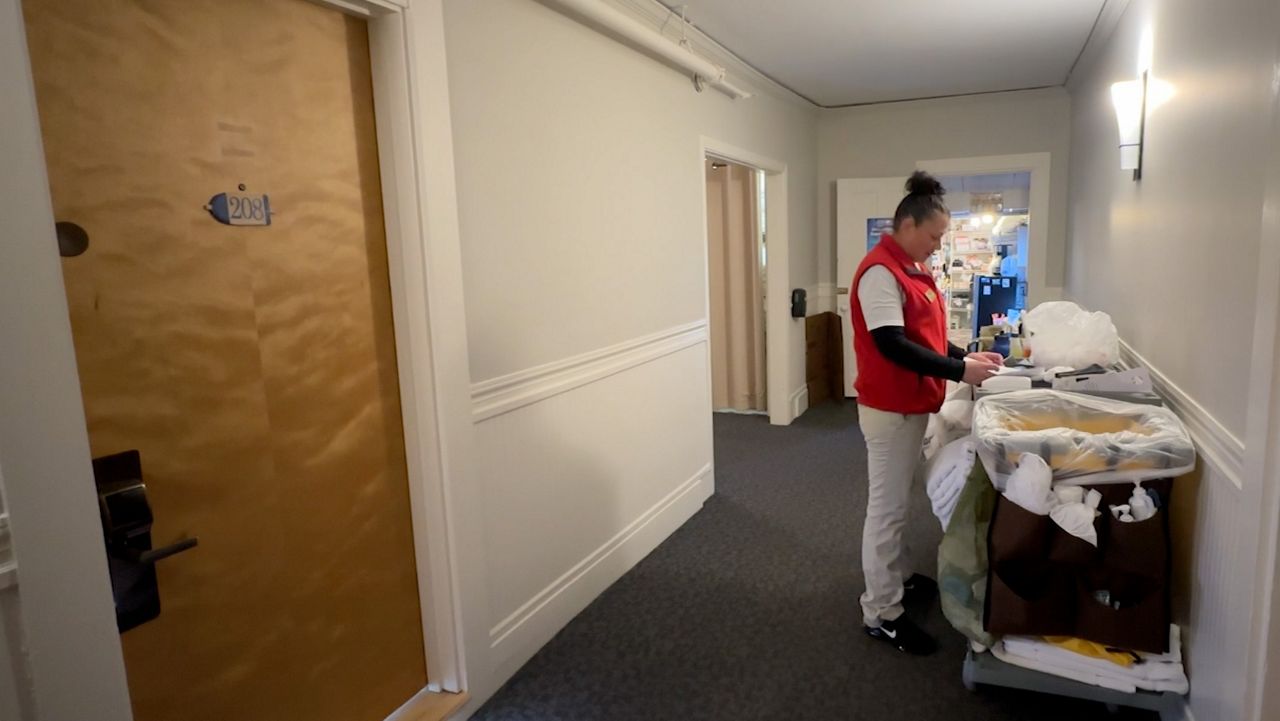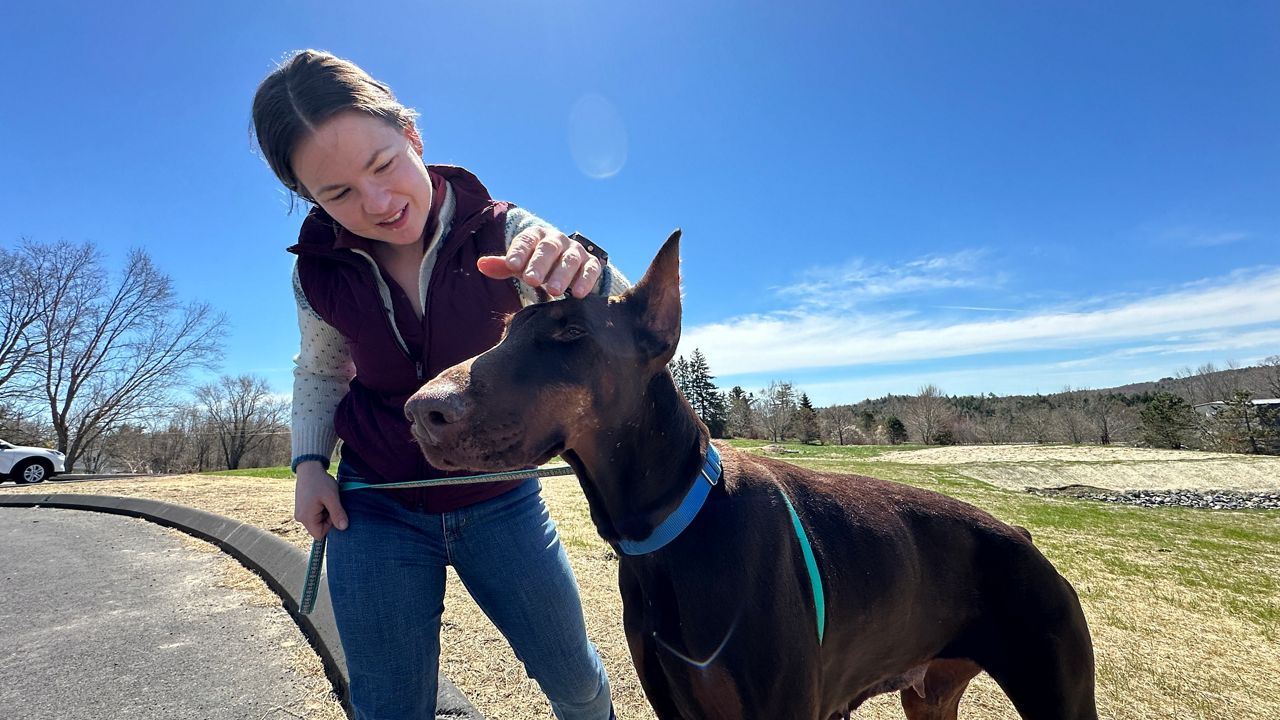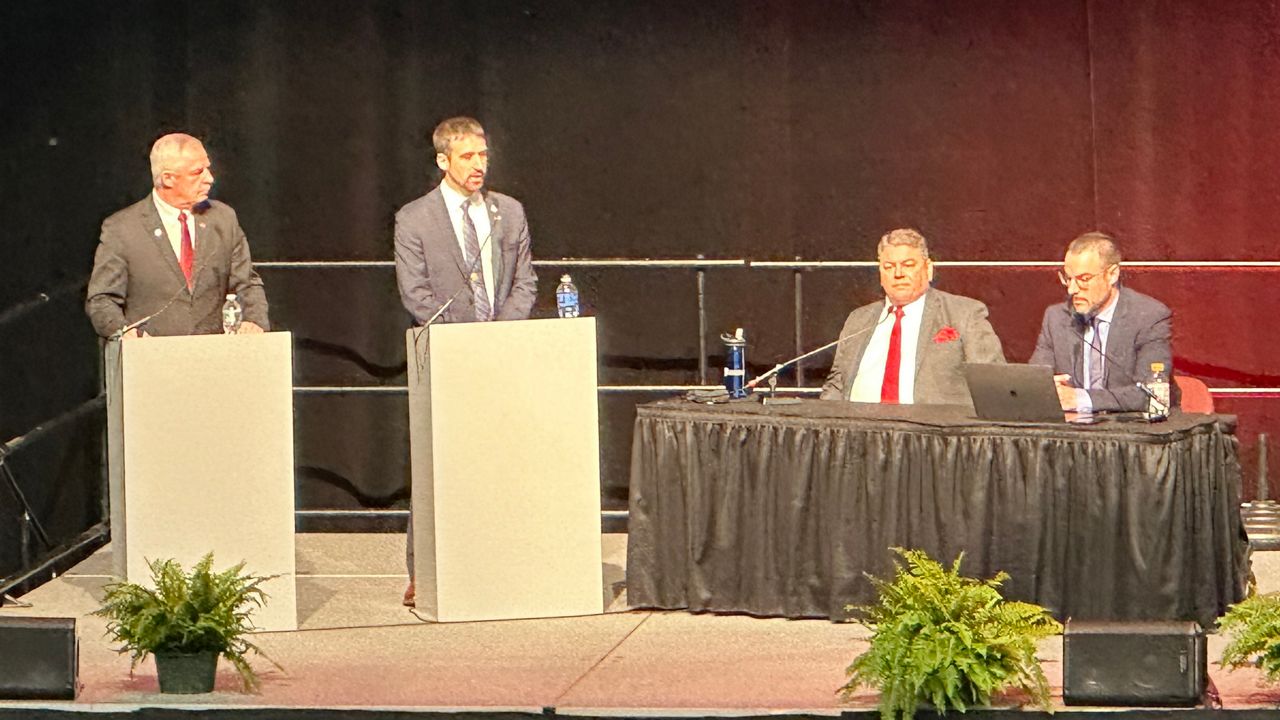Last year, Tara Boutilier was doing a sentence in state prison for drug offenses, one of a few she’s served as part of her ongoing struggle with substance abuse and the legal trouble that inevitably goes with it.
Now, she fluffs pillows for a living. Boutilier, 41, is one of the latest of Maine’s recently incarcerated to be hired by the Nonantum Resort in Kennebunkport, part of an ongoing initiative the hotel calls Raising People Up to give a second chance to those who might not otherwise have it.
“I think the people here are quite proud to be helping others,” said Jean Ginn Marvin, who describes herself as the “innkeeper,” and whose family owns the resort.
The Nonantum is just minutes from the quaint downtown Kennebunkport shopping area, and next door to estates with sweeping front lawns and waterfront views. The resort itself has an upscale-yet-homey feel, complete with framed photos on the walls of the lobby featuring staff members posing with former presidents. Not the kind of place one might expect to employ people who have been convicted of felonies.
But Marvin is unapologetic, firmly committed to the idea of helping others, and she has no patience for people who can’t understand that.
“If that’s who they are, then they probably don’t belong here,” she said.
Boutilier said she became addicted to heroin, and has been arrested on various drug possession charges, including heroin and cocaine. She has had a rocky road to recovery, finally getting out of prison and getting sober in May of this year, but she still worried the stigma of her past, including her incarceration, would prevent her from finding employment. When the Nonantum offered her a job in housekeeping and landscaping, she said it was like the stigma had disappeared.
“They were great,” she said. “They were so welcoming.”
The resort’s program started with Marvin’s daughter, Colby Bracy, who is also the resort’s director of people and operations. She said she has always had a fascination with what makes a person go down a bad path in life, and whether it’s possible to change.
“The impetus behind it, it’s hard to pinpoint,” she said. “I just feel like it’s just the right thing to do.”
The program formally began back in 2021, with Bracy and Marvin visiting a state prison in Windham. They began interviewing people convicted of nonviolent crimes whose sentences were ending and looking for work.
Since then, the resort has hired about 15 people, all working a variety of jobs, including maintenance, groundskeeping and housekeeping positions.
“What I’ve found is they’re willing to do pretty much anything,” Bracy said.
There is plenty of work to go around. The resort has 109 rooms and employs a skeleton crew of 25 through the winter, but during the tourist season the staff balloons to 200. Marvin said one concern she had when the program started was how her existing staff members would react. Upon being told, she said, they were unexpectedly enthusiastic, all sharing stories about loved ones who could have used such an opportunity once.
“It made me realize there’s a lot of compassion with our staff,” she said. “They love being part of a second-chance employer.”
Bruce Noddin is founder and executive director of the Maine Prisoner Re-Entry Network, a nonprofit that works with incarcerated people in Maine to help them transition into ordinary life upon release. He said there are some employers in Maine that already do what Nonantum is doing. For example, he said, Bath Iron Works has employed the formerly incarcerated, and the Samoset Resort in Rockport has been known to hire minimum-security prisoners to work even while still serving their sentences.
“It’s not unheard-of,” he said.
Noddin said he was unfamiliar with Nonantum’s program but said, “It sounds really proactive, so I applaud them.”
Noddin noted that prior to the pandemic, Maine typically had about 1,300 people being released from prison per year, and the same number being released from jails. While the numbers dipped during the pandemic, and current figures are not available, he said, “They’re probably back up to pre-COVID levels.”
That means, Noddin said, there are a lot of formerly incarcerated people statewide who are looking for work, and to rebuild their lives. With a shrinking workforce in Maine, he said, there’s the potential to solve two problems at once.
“Employers are in such need of employees right now,” he said.
But it may not be that easy. Margo Walsh is founder of Maineworks, a company founded in 2011 that helps people with barriers such as a prison record find work. She said a person leaving prison is going from a structured, regimented life to suddenly being on their own. In addition, many are still grappling with issues such as substance use disorder.
“You have to be really careful,” she said. “They’re still dealing with a life-changing incarceration.”
Noddin agreed, noting that a person coming out of prison also cannot be expected to have things the rest of us take for granted, such as cell phones.
“They come out with virtually nothing,” he said.
Marvin said she and the resort did not start the program to solve a workforce problem. She said the resort typically has no problems finding staff. Reaching out to the incarcerated, she said, is an offer to help, not an attempt to fill the resort’s ranks.
“The reason to do this is to help people, not because you’re looking for bodies,” she said.
Marvin said she also knows the reality of the needs of former prison inmates all too well, calling it the “gross unpreparedness” many of them face. She recalled one formerly incarcerated employee showing up for his first day of work wearing a pair of flip-flops, sweatpants and an undershirt. He carried nothing, not even a photo id.
The resort staff, Marvin said, responded by taking the man to get a photo id, and even helping him set up a bank account so he could get paid. The resort also works with recovery centers in the area, such as Journey House in Sanford, to offer recently released employees a place where they can have structure and, if they need it, treatment. That kind of compassion, she said, makes a difference in how well a person transitions back into ordinary life.
“When they have someone taking care of them, when they have someone worrying about them, it’s a whole different ball game,” she said.
Boutilier vouched for the resort’s compassion. She and her boyfriend, Bobby Bell, who is also formerly incarcerated and works at the resort, were homeless one night when they could not afford their apartment in Freeport. She said the two were prepared to sleep outside in a vehicle until the Nonantum staff found out.
“They were like, ‘Nope, that’s not happening,’” she said.
The resort arranged for them both to move into staff housing on the resort’s property, a dormitory-style building with eight bedrooms the resort uses for the program’s workers who are transitioning into permanent housing.
There is evidence to show the program is working. Of the 15 employees the resort hired, 10 are still working there. Three moved on to other jobs. Only two were fired for relapsing into using drugs, and Marvin said even then the employees in question were open and honest and continue to seek help in recovery. Marvin said the resort stays in touch with all five of the employees no longer working there.
“We’re in contact with them,” she said. “It’s not like they disappear off the face of the Earth.”
Most importantly of all, Marvin said, not one of the employees hired through the program has been caught stealing or committing any other offenses. They are all too grateful for the opportunity to build a new life for themselves, she said.
Boutilier said she is beyond grateful. She wants to remain an employee of the resort as long as possible. She likes the work, and said she feels like she can start her life over there, putting her past behind her where it belongs. She said Marvin and her staff have been instrumental in helping her do that.
“They’re all like family, and what they can do to help,” she said.








)